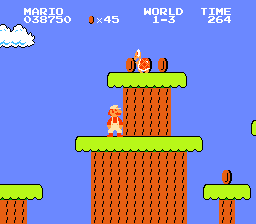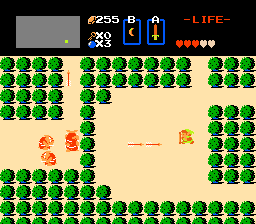

|
Introduction History Developing in The Industry Today Creativity and Innovation Rez Convergence and Deus Ex Conclusion Links Contact Bibliography |
HistoryFrom 1985 to 1995, Japanese gaming heavyweights Sega and Nintendo ruled the global video games industry (comprised of home console and arcade based games, as opposed to computer games, played on a PC). Their 8-bit consoles, the NES and Master System, and their 16-Bit consoles, the Super NES and Mega Drive allowed for far more advanced and entertaining gameplay than had ever been possible before. These systems saw games evolve from the fairly simple likes of Space Invaders, Pac Man and Pong, into bigger, more complex affairs that formed the foundations of how video games operate today. All the while, games were steadily growing in popularity, and it was only a matter of time before companies outside the gaming industry realized their potential as an extremely profitable mainstream form of entertainment.   Nintendo's Super Mario Bros. and The Legend of Zelda, both revolutionary games of their time. (© Nintendo) This happened in 1994, when electronics company Sony released their Playstation console in Japan, and attempted to do something that had never been successfully achieved before in the gaming industry - lure the mass market into the world of video games. Before the Playstation, video games were typically marketed specifically towards traditional games playing demographics - children and "hardcore" gamers. Sony however, whose intention it was to bring video gaming to new demographics, adopted a different approach. Games Investor tells of how Sony's "greater emphasis towards club culture and 'twenty-somethings' resulted in a much older initial Playstation user base than pervious consoles had achieved." This effectively resulted in a broader social acceptance of video games, which were often previously portrayed as things only kids or "geeks" used. Thanks to Sony's clever marketing strategies, the Playstation was an astounding success, and its broad appeal to the mainstream market resulted in astounding growth in the video games industry as a whole. Games console sales (excluding the portable Nintendo Game Boy systems) in the 32/64-bit era of the Sony Playstation, Nintendo 64 and Sega Saturn sold around 130 million units worldwide as of 2002 - approximately twice the number of consoles sold in the 16-bit era of the Sega Mega Drive and Super Nintendo (Games Investor, 2002). It was during the 32/64-bit era that video games became the mainstream form of entertainment that they are today, and as a result, the gaming industry experienced significant economic growth.
 (Chart © Gamesinvestor.co.uk) |